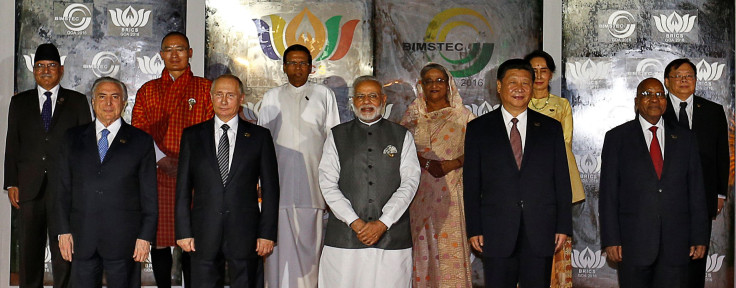Which Country Has The Biggest Economy? China Leads As India Surpasses US And Russia Leads Europe By 2050

Emerging markets will dominate the existing economic order by the year 2050, with traditional leading nations in the West falling back to new, rapidly developing economies, according to a report released this month by PricewaterhouseCoopers (PwC). The firm measured nations by gross domestic product (GDP) at purchasing power parity (PPP).
The report, released this month and entitled "The Long View: How will the global economic order change by 2050?," showed China remaining the world's largest economy, a title bestowed upon it by the International Monetary Fund in 2014. The U.S. eventually fell to third, behind India. Next, Indonesia would become the second-biggest economy in Asia, overtaking Japan, which fell from fourth in 2016 to eighth in the last 2050 ranking. Brazil would climb to fifth, making it the second-largest economy in the Western hemisphere. Russia remained in sixth place, but other European competitors, Germany and the U.K., fell to ninth and tenth places, respectively. Mexico, which was not previously on the top ten list, came in at seventh.
The document revealed a stunning show by countries sometimes labeled "third world" that have vowed to boost their economies and take a greater role in the dynamics of the international financial order.
Several of these countries — Brazil, Russia, India and China — have been classified as BRIC countries and are believed by many experts to rise in the next economically in the next few decades. In 2010, South Africa, which also made gains in this month's report, was added to the grouping, changing the acronym to BRICS. Other countries such as Vietnam, Bangladesh and Nigeria were credited with some of the fastest overall growth.
The firm's researchers noted the anticipated success of the developing economies, but also warned of great volatility that must be taken into account for such long-term projections.
"Our analysis shows the great potential that emerging economies have to grow and prosper over the coming decades. But to realise this potential in full, they must undertake sustained and effective investment in education, infrastructure and technology," the document read.
PwC is an international professional services firm headquartered in London and has been considered one of the four big auditing firms in the world along with Deloitte, EY and KPMG. It was ranked the most prestigious accounting firm in the world for seven years in a row by Vault Accounting 50 and in North America by CPA Practice Advisor for three years in a row. It was established in 1998 after two existing firms, Coopers & Lybrand and Price Waterhouse, formed the fifth-largest privately owned company in the U.S., according to Forbes.
3.1K1
— राजेश सिंह 🇮🇳 (@raku65) February 7, 2017
US economy will lose steam and fall behind India by 2050, says consulting firm PricewaterhouseCoopers (PwC). pic.twitter.com/NX2CR4DFRS
© Copyright IBTimes 2025. All rights reserved.






















